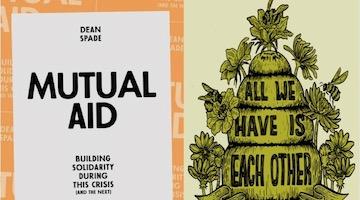Our theorizing must take on the dynamic, fugitive, and excessive aesthetics of black practice and performance.
“The black body is tortured by the slavemaster’s whip, but also the’“abolitionist’s’ empathic identification with the black body.”
In this series we ask organizers, artists, and academics to share readings that inform their thinking about abolition. This week’s contributor is Semassa Boko.
Three texts that radicalized me:
Funk! by Rickey Vincent
The OG funk historian Rickey Vincent wrote this seminal text in the mid-90s. Full of sharp analysis spanning history, geography, social biography, and music criticism, Vincent not only introduced me to funk music, but helped me to understand “funk” as a concept irreducible to the genre bearing the same name. The book introduced me to the power of analyzing artistic and cultural production for the meaning in form, when conventional US education teaches students to focus on content, and only sometimes context. It is easy to identify so-called “protest music” when the lyrics are explicitly about the violence of whiteness or the violence of the state – it is not as easy to identify when shifts in aesthetic form constitute a revolt. What to some seemed like frivolous dance music was actually a riot of the mind and body, a rebuke of the proper, a cry for the abolition of the world. Black art and cultural production would never look the same to me again. Cornel West says that his writing is like blues music, meaning that the theory embodied in blues performance is immanent in how West writes. I want my writing to have the same relationship to funk.
Theory in Black: Teleological Suspensions in Philosophy of Culture,” by Lewis Gordon
By studying the intellectual legacies of the black intellectual luminaries DuBois and Fanon – among others – Gordon asks us to contemplate what blackness does to the project of theory. Whiteness mystifies its particularism through claims to universality, making blackness a permanent anxiety-inducing threat that threatens to blacken the false halo of the post-Enlightenment world. Theory in black is an unruly posture that exceeds academic calls for “interdisciplinarity” and refuses one-size-fits-all answers or approaches. Dogmatic allegiance to “method,” whether that method came from the academy or the streets, “facilitates the epistemic rejection of reality.”Abolition is as much an experiment in new ways of thinking and producing knowledge as anything else. Our theorizing must take on the dynamic, fugitive, and excessive aesthetics of black practice and performance. The work also cannot be hamstrung by respectability and a teleological commitment to individual ethics that often forecloses the necessarily messy and chaotic work of birthing a new world. One cannot be a radical or an abolitionist until one rejects the trajectory of thought established in the halls of Europe; there will be no new world until we abandon Western “reason” and all its baggage.
“What kind of mother is she?: From Margaret Garner to Rosa Lee Ingram to Mamie Till to the Murder of Korryn Gaines,” by Tiffany Willoughby-Herard and Lashonda Carter
Willoughby-Herard and Carter write with the sort of care, rigor, and gravitas that I continually aspire to. This article takes seriously the long durée of black women’s self-defense in the domains of maternity, reproduction, and bodily autonomy. I place myself in a black radical tradition where the goal is to abolish the whole world. And according to Saidiya Hartman, the black women’s womb is the “belly of the world”; the black feminist movement for reproductive justice is therefore the beating heart of abolition. This paper pushed me to better think about less considered forms of state brutality, such as the arrest and harassment which ended in Korryn Gaines' "state-violence-induced miscarriage.” Most importantly, this paper is a call to an intramural conversation among black folks about the sorts of unsympathetic responses to the terror and violence visited by the state upon black women, as well as what projects for the defense, cultivation, and socialization of the black maternal can mean when approached with care and thoughtfulness. Thank you Dr. Tiffany Willoughby-Herard for the labor of mothering you exude in the midst of this noxious university and the academy, I will take your care and multiply.
Two texts I think with every day:
The Sovereignty of Quiet: Beyond Resistance in Black Culture, by Kevin Quashie
Quiet is many things in Quashie’s book: surrender, interiority, vulnerability, existentialism, exercise of agency, oneness – a presence which can have social and political impact without aiming for such. Quashie reads scenes of black performance and cultural production against the grain as vigorous and sometimes ghostly scenes of quiet. Though I only recently read this book, I’ve thought alongside Quashie’s rich interventions for a long time. I might still be young, but I am already exhausted by the way that narratives of resistance and public expression saturate representations of blackness. These narratives stem from the reduction of blackness to the biological, the physical, the visual. Let me be clear: as an avowed afropessimist, I believe that the gratuitous violence of the antiblack world overdetermines black “agency” and performance; I simply despise the idea that we must always categorize our struggles to navigate that soup of violence as “resistance” or imbue it with dignity. I also want to meditate on failure, retreat, defeat, and abject indifference. I do not want to be an activist – I want to be a quiet being who loves, heals, screws up, oversleeps, ruminates, cries alone, and daydreams too much. Blackness is the right to opacity and mystery.
“People-of-Color-Blindness: Notes on the Afterlife of Slavery,” by Jared Sexton
The difference between an analysis of structural positionality and the flattening of lived realities really be throwing a lot of y’all for a loop. Don’t let that “people of color” moniker fool you, blackness is of a different order than the myriad other marginalized identities. Listen to Sexton: “Black existence does not represent the total reality of the racial formation...but it does relate to the totality...racial formation is most fully understood from this vantage point.” The primary nexus of issues under investigation in this article relate to the different ways that scholars and activists overlook or outright dismiss the centrality of an analytical and practical emphasis on antiblackness and the centrality of racial slavery to the making of the modern world.
Sexton employs a number of tools and strategies, from critiques of misguided contemporary political theory, to multiple film analyses, to several readings of discursive and performative patterns in multiracial and coalitional activist/organizing spaces. As an abolitionist the question that I must continually return to is this: what world did slavery make possible? And every answer must go. Every nation, every NGO, every voting booth, every house, every commodity, every desire to be human. All must go.
One book every abolitionist should read:
Scenes of Subjection, by Saidiya Hartman
My primary research interest lies in understanding the different ways that violence can be conceptualized. The contemporary world socializes people to perceive violence as an organic, self-evident phenomenon, in ways that obscures the full spectrums of harm in the social, psychic, and ontological realms that are structured in ways that render black bodies nakedly vulnerable to perpetual violation. In her exacting examination of black performance, Hartman renders the plantation economy (political and libidinal) as an allegory of the present. The black body is tortured by the slavemaster’s whip, but also the “abolitionist’s” empathic identification with the black body. Slavery is a property relation, not a labor relation. Read this book to understand why the circulation of dead and tortured black people produces in nonblack people not disgust or raised consciousness, but pleasure. How can this condition be redressed? Here we also return to black women’s self defense of their bodily autonomy with Celia – the slave who resisted her master’s advance, killed him, and tossed his body into flames. Celia reminds us that yes the world must burn, but the proper kindling is plantation owners’ spine, where the ashes of those bones will nourish the new world.
Semassa Boko is a cultural worker, freelance writer, and current PhD student in sociology and critical theory at the University of California, Irvine. He is driven by the need to pose rigorous and generative questions regarding social change, violence, war, black music, and aesthetics through his scholarly research as well as through music reviews, poetry, speeches, and various forms of community involvement. Black study is his way of life and black liberation defines his dreams.
Please join the conversation on Black Agenda Report's Facebook page at http://facebook.com/blackagendareport
Or, you can comment by emailing us at comments@blackagendareport.com















